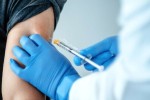MAIN EVENTS
COVID 19, THE APPEAL OF THE FONDAZIONE MEDITERRANEO: "THE IDEAL VACCINE MUST BE PRODUCED AND SPREAD"
|
23 June 2021
Iniziative (EN) -
Maison de la Paix (EN)
 "We are all currently undergoing mass testing. The current vaccine has short-term immune coverage and is hypothesized to trigger thrombotic phenomena. It is essential to achieve the production and dissemination of a vaccine that is safe and accessible to all: the ideal vaccine." It is essential to achieve the production and dissemination of a vaccine that is safe and accessible to all: the ideal vaccine. "This is what the Fondazione Mediterraneo and its experts underline is necessary in this moment, in which the Coronavirus pandemic has generated an information chaos and of indications.
"We are all currently undergoing mass testing. The current vaccine has short-term immune coverage and is hypothesized to trigger thrombotic phenomena. It is essential to achieve the production and dissemination of a vaccine that is safe and accessible to all: the ideal vaccine." It is essential to achieve the production and dissemination of a vaccine that is safe and accessible to all: the ideal vaccine. "This is what the Fondazione Mediterraneo and its experts underline is necessary in this moment, in which the Coronavirus pandemic has generated an information chaos and of indications.
Corrado Perricone, Neapolitan hematologist former head of the Immunohematology Center of Santobono-Pausilypon and former member of the Superior Health Council, explains:
"Since the Spike protein was highlighted, in relation to its possible use as a Coronavirus vaccine, we had dreamed of having solved the problem: today, on the other hand, we find ourselves having to face a new reality, namely that of finding other more valid alternative solutions".
"We are all the subject of a mass experimentation with current vaccines", underlines the Fondazione Mediterraneo in the appeal: moreover, the current vaccine that "has a short-term immune coverage, being immunity linked to the virus in its entirety it contains as components 27 proteins while the vaccines in use can only use the one available that is the Spike protein".
The "ideal vaccine should have high immunogenicity and an established ability to induce effective immune responses".
The problem of thrombi and the two proposed investigations.
The researchers at Northeastern University in Boston hypothesize that it may be the viral protein "S" that triggers the thrombotic phenomena, "binding the now well-known ACE 2 receptor on the endothelium (inner lining) of the vessels and thus triggering the cascade of events that leads to the formation of thrombi", continues the haematologist.
The former member of the CSS explains that before this crisis the vaccine was understood as a "method of immunization through the insertion into the human body of an attenuated pathogen or a subunit of it". Unfortunately, "it escapes most of us - he continues - that the administration has an absorption phase that brings it into the systemic circulation so that the organism recognized as a foreign body produces selective antibodies against protein S. In reality, the production of protein S does not is under control and consequently the secretion and production of protein S and also the associated risks are absolutely unpredictable".
In this regard, Perricone underlines the study just published in the European Journal of Internal Medicine entitled "Sars Cov2 Vaccines: Lights and Shadows", "which takes stock of protein S and its possible role in inducing alterations in endothelial function. and platelet aggregability; this unpredictability could also explain the susceptibility of people without a known thromboembolic risk".
The Fondazione Mediterraneo proposes two surveys. The first: "Check the normal functioning of the immune system to be sure that the subject is suitable and will be able to withstand the vaccine, taking note of any risk", where "it appears essential to give a certain certainty of not having a predisposition hereditary (quite frequent case) that can be carried out by means of a flow cytometer and a simple sampling". The second: “the search for the genetic variant factor II and factor V Leiden as well as MTHFR”.






